 Indiana's Republican Governor Mitch Daniels will not be able to appoint a replacement for the recently elected Secretary of State Charlie White, who is currently under indictment for seven felony counts, three of them --- ironically enough for the state's chief election official --- for voter fraud.
Indiana's Republican Governor Mitch Daniels will not be able to appoint a replacement for the recently elected Secretary of State Charlie White, who is currently under indictment for seven felony counts, three of them --- ironically enough for the state's chief election official --- for voter fraud.
On Wednesday, we updated the sad story of White, who is facing both a criminal complaint after being indicted by a grand jury as well as a civil complaint brought by state Democrats. The basis for both cases is tied to evidence that White used his ex-wife's residence for his voter registration and then knowingly voted at the wrong precinct (including for himself in last November's election), all while illegally serving on the Fishers Town Council despite not living in the town of Fishers.
We initially covered the White story last month after the new Secretary of State was indicted, detailing the ever-growing list of top Republicans --- which now includes both GOP superstar Ann Coulter and Utah's former governor and possible 2012 GOP Presidential hopeful Jon Huntsman among others --- who are alleged to have committed felony voter fraud and voter registration fraud. The charges against White play out against the irony of the GOP's oft-echoed but ever-unsubstantiated charges of a "Democratic voter fraud" epidemic, claimed as a propaganda tool to support new voter suppression laws at the polling place. Indiana's own polling place Photo ID restrictions, instituted in 2008, are regarded as the most draconian and disenfranchising in the nation --- although they didn't serve to keep White from illegally voting.
In our story earlier this week, we explained that White --- who has refused to resign amidst the scandal --- and the state Republican Party have been doing their best to slow-walk both the criminal and civil cases, in hopes of running out the clock until the state legislature could pass a law allowing Gov. Daniels to appoint a new Sec. of State to replace White. Existing law, the Democrats argue, requires that the top vote-getter legally on the ballot in last November's election be named to the post. In this case, that would be the Democratic nominee Vop Osili.
But it now appears that Republican state legislators have all but given up hope for such a law to be passed in time to save the day, and the judge assigned to the civil case has once again this week denied a request by White to stall the case further...
The agreement was filed Thursday, a day after a top House Republican said she was uncomfortable with lawmakers intervening in an ongoing court case.
The agreement on the bill applies the appointment provision only to future elections.
Both the House and Senate still have to approve the compromise for it to become law.
[Update: A few mor details are offered in this version of AP's report.]
So, it seems, the hope of Republicans to have their governor replace White has now been dashed --- assuming the House/Senate compromise bill is passed and signed by Daniels.
In the meantime, Marion County Circuit Judge Louis Rosenburg held another hearing in the civil case on Thursday, after he had ordered the state Republican Committee to explain why they should not be held in contempt for ignoring his previous rulings in the case.
Earlier this month, Rosenburg had ordered that the state Recount Commission review the Democrats' complaint against White's eligibility to be on the ballot, after they had dismissed it last December following his election. The judge ruled their complaint was valid and that the commission --- which has a 2 to 1 Republican majority, should move quickly to investigate and resolve the matter. One of three members on the commission is White himself, though he has recused himself from the case. However, the state GOP had failed to name someone to replace him, further helping to stall the matter, until Rosenburg ordered earlier this week that someone be appointed within two days. They finally complied.
At Thursday's hearing, Rosenburg denied White's motion to put the civil case on hold until after his criminal case was resolved. according to the Indianapolis Star, the judge said "the public interest is in resolving this matter." He went on to charge the uncertainty about the charges and the validity of White to serve are "impairing" the ability of the Secretary of State's office to carry out their duties.
Following the hearing, state Democratic Chairman Dan Parker said, "Hopefully there are going to be some deadlines set so we can get discovery moving, we can get the case moving and people can finally know once and for all who their secretary of state is going to be."
For their part, White's attorneys said they intend to appeal Rosenburg's ruling. They have already filed an appeal to the April 7th decision finding the Indiana Recount Commission had improperly dismissed the Democrats' challenge to White's eligibility to be on the ballot.
On Tuesday, a New York Times editorial slammed what they called the latest "Republican Threat to Voting," as laws likely to disenfranchise millions of legal, Democratic-leaning voters are once again being pushed by GOP legislators in state after state.
The effort is described as "the largest legislative effort to scale back voting rights in a century," as Republicans in "more than 30...states...[are joining] the bandwagon of disenfranchisement, as Republicans outdo each other to propose bills with new voting barriers."
"Spreading fear of a nonexistent flood of voter fraud," the paper wrote, "they are demanding that citizens be required to show a government-issued identification before they are allowed to vote."
While some 21 million legal voters --- mostly minorities, students, and some elderly --- do not have the sort of state-issued Photo ID that would be required under such laws, polling place impersonation, in fact, is extremely rare.
Of far greater danger to elections, at least in the realm of voter fraud, is absentee voting, which most of the proposed bills do not address. The greatest danger of all is posed by insider election fraud, which can be carried out by a single administrator or voting machine company employee with the ability to completely change the results of an election with a few key strokes, and very little possibility of detection.
Polling place Photo ID restrictions of the type being pushed by Republicans across the country, and already in place in Indiana, would have no effect on voter fraud criminals like Charlie White. While elderly nuns, students, and veterans have already been turned away by Indiana's Photo ID laws since implemented, White was allowed to vote last year without a problem, even though he was apparently illegally registered to do so.


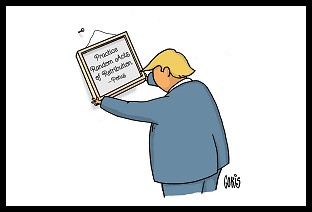 Sunday 'Random Acts of' Toons
Sunday 'Random Acts of' Toons From CA's 'Nuclear Deterrence' Map to Newsom's Trolling to Trump's 'Fascist Theatre' and Beyond: 'BradCast' 8/21/25
From CA's 'Nuclear Deterrence' Map to Newsom's Trolling to Trump's 'Fascist Theatre' and Beyond: 'BradCast' 8/21/25 'Green News Report' 8/21/25
'Green News Report' 8/21/25
 On 'Americanism' and Trump's 'Stalinesque' Plot to Whitewash U.S. History: 'BradCast' 8/20/25
On 'Americanism' and Trump's 'Stalinesque' Plot to Whitewash U.S. History: 'BradCast' 8/20/25 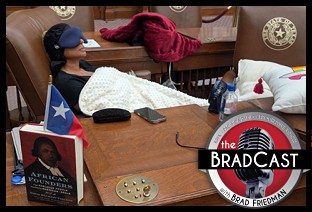 Texas GOP Imprisons Dem State Lawmaker in State House Chamber: 'BradCast' 8/19/25
Texas GOP Imprisons Dem State Lawmaker in State House Chamber: 'BradCast' 8/19/25 'Green News Report' 8/19/25
'Green News Report' 8/19/25 Trump, Nazis and
Trump, Nazis and  Sunday '
Sunday ' Newsom's 'Election Rigging Response Act'; FCC's License Renewal for Sock-Puppeting Sinclair: 'BradCast' 8/14/25
Newsom's 'Election Rigging Response Act'; FCC's License Renewal for Sock-Puppeting Sinclair: 'BradCast' 8/14/25 'Green News Report' 8/14/25
'Green News Report' 8/14/25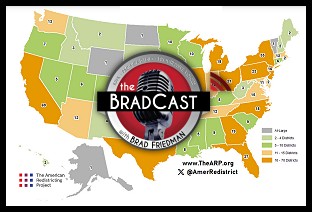 140 New House Reps?: Moving Beyond the Gerrymandering Wars: 'BradCast' 8/13/25
140 New House Reps?: Moving Beyond the Gerrymandering Wars: 'BradCast' 8/13/25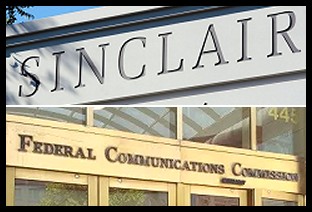 FCC Renews Sinclair TV Licenses Despite Complaint from Petitioner Who Died Waiting
FCC Renews Sinclair TV Licenses Despite Complaint from Petitioner Who Died Waiting It's Not About the Rule of Law, It's About Authoritarian Control: 'BradCast' 8/12/25
It's Not About the Rule of Law, It's About Authoritarian Control: 'BradCast' 8/12/25 'Green News Report' 8/12/25
'Green News Report' 8/12/25 After Vaccine Cancels, CDC Shooting, Former Officials Want RFK Out: 'BradCast' 8/11/25
After Vaccine Cancels, CDC Shooting, Former Officials Want RFK Out: 'BradCast' 8/11/25 Sunday 'All's Well' Toons
Sunday 'All's Well' Toons 'Green News Report' 8/7/25
'Green News Report' 8/7/25 Trump Wars Against Greem Energy, Democracy on VRA's 60th: 'BradCast' 8/7
Trump Wars Against Greem Energy, Democracy on VRA's 60th: 'BradCast' 8/7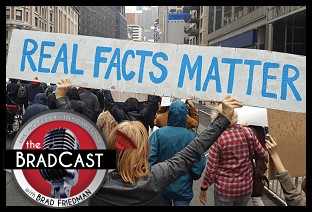 Media Conglomerates Continue Trump Capitulation: 'BradCast' 8/6/25
Media Conglomerates Continue Trump Capitulation: 'BradCast' 8/6/25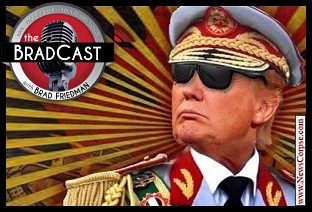 Banana Republican: Trump Shoots the Labor Statistics Messenger: 'BradCast' 8/5/25
Banana Republican: Trump Shoots the Labor Statistics Messenger: 'BradCast' 8/5/25 All's Fair in Love, War and, Apparently, Part-isan Gerrymandering: 'BradCast' 8/4/25
All's Fair in Love, War and, Apparently, Part-isan Gerrymandering: 'BradCast' 8/4/25 The Art of the Corrupt, Phony, Unlawful, Pretend Trade Deal: 'BradCast' 7/31/25
The Art of the Corrupt, Phony, Unlawful, Pretend Trade Deal: 'BradCast' 7/31/25 Battle Begins Against Trump EPA Climate Regulations 'Kill Shot': 'BradCast' 7/30/25
Battle Begins Against Trump EPA Climate Regulations 'Kill Shot': 'BradCast' 7/30/25 A Pu Pu Platter of Trump Corruption: 'BradCast' 7/29/25
A Pu Pu Platter of Trump Corruption: 'BradCast' 7/29/25 'Catastrophic' GOP Cuts to Medicaid, Medicare, ACA: 'BradCast' 7/28/25
'Catastrophic' GOP Cuts to Medicaid, Medicare, ACA: 'BradCast' 7/28/25
 VA GOP VOTER REG FRAUDSTER OFF HOOK
VA GOP VOTER REG FRAUDSTER OFF HOOK Criminal GOP Voter Registration Fraud Probe Expanding in VA
Criminal GOP Voter Registration Fraud Probe Expanding in VA DOJ PROBE SOUGHT AFTER VA ARREST
DOJ PROBE SOUGHT AFTER VA ARREST Arrest in VA: GOP Voter Reg Scandal Widens
Arrest in VA: GOP Voter Reg Scandal Widens ALL TOGETHER: ROVE, SPROUL, KOCHS, RNC
ALL TOGETHER: ROVE, SPROUL, KOCHS, RNC LATimes: RNC's 'Fired' Sproul Working for Repubs in 'as Many as 30 States'
LATimes: RNC's 'Fired' Sproul Working for Repubs in 'as Many as 30 States' 'Fired' Sproul Group 'Cloned', Still Working for Republicans in At Least 10 States
'Fired' Sproul Group 'Cloned', Still Working for Republicans in At Least 10 States FINALLY: FOX ON GOP REG FRAUD SCANDAL
FINALLY: FOX ON GOP REG FRAUD SCANDAL COLORADO FOLLOWS FLORIDA WITH GOP CRIMINAL INVESTIGATION
COLORADO FOLLOWS FLORIDA WITH GOP CRIMINAL INVESTIGATION CRIMINAL PROBE LAUNCHED INTO GOP VOTER REGISTRATION FRAUD SCANDAL IN FL
CRIMINAL PROBE LAUNCHED INTO GOP VOTER REGISTRATION FRAUD SCANDAL IN FL Brad Breaks PA Photo ID & GOP Registration Fraud Scandal News on Hartmann TV
Brad Breaks PA Photo ID & GOP Registration Fraud Scandal News on Hartmann TV  CAUGHT ON TAPE: COORDINATED NATIONWIDE GOP VOTER REG SCAM
CAUGHT ON TAPE: COORDINATED NATIONWIDE GOP VOTER REG SCAM CRIMINAL ELECTION FRAUD COMPLAINT FILED AGAINST GOP 'FRAUD' FIRM
CRIMINAL ELECTION FRAUD COMPLAINT FILED AGAINST GOP 'FRAUD' FIRM RICK SCOTT GETS ROLLED IN GOP REGISTRATION FRAUD SCANDAL
RICK SCOTT GETS ROLLED IN GOP REGISTRATION FRAUD SCANDAL VIDEO: Brad Breaks GOP Reg Fraud Scandal on Hartmann TV
VIDEO: Brad Breaks GOP Reg Fraud Scandal on Hartmann TV RNC FIRES NATIONAL VOTER REGISTRATION FIRM FOR FRAUD
RNC FIRES NATIONAL VOTER REGISTRATION FIRM FOR FRAUD EXCLUSIVE: Intvw w/ FL Official Who First Discovered GOP Reg Fraud
EXCLUSIVE: Intvw w/ FL Official Who First Discovered GOP Reg Fraud GOP REGISTRATION FRAUD FOUND IN FL
GOP REGISTRATION FRAUD FOUND IN FL

































